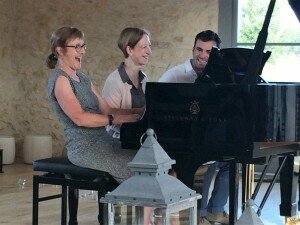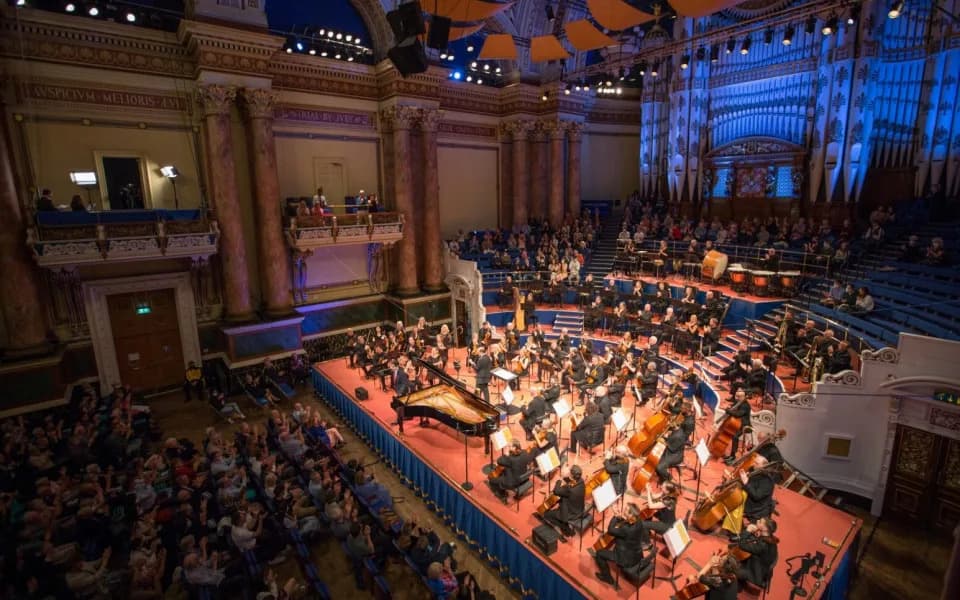 Amateurs have nothing to lose by being musically true to themselves…… professionals are sometimes too intimidated to display their individuality
Amateurs have nothing to lose by being musically true to themselves…… professionals are sometimes too intimidated to display their individuality
– Daniel Martyn Lewis, concert pianist
The world of the adult amateur pianist is rich, vibrant and varied. In researching this article I came across myriad stories of triumph over adversity, personal tragedy and dogged determination, of unhappy childhood lessons abandoned only to rediscover the joy of the piano later in life, of exam successes and the frustrations of practicing, but what runs, fugue-like, through all these accounts is a genuine and often profoundly deep passion for the piano.
The cultivation of and participation in the activity of playing the piano, and the commitment to it, is very strong amongst amateur pianists, perhaps because the activity is undertaken voluntarily, not for money, and for the intrinsic pleasure of playing and also striving to improve.
The more you learn, the more you realise you still have to learn – so you never run out of stuff to do. You can take as long as you like to learn something difficult, or learn something easy within a short time.
– an adult amateur pianist
Adult pianists enjoy greater autonomy and self-determination than they probably did as children taking lessons, when there was parental and teacherly pressure to practice and progress, the treadmill of exams, and being made to learn repertoire which they disliked (this is very much my own memory of childhood piano studies). Being solely responsible for selecting your own repertoire and organising practice time is often far more satisfying. A love of the learning process is also very important in fostering a willingness to stick at the task and many adult pianists continue in their piano endeavours because they enjoy being the perpetual student or lifelong learner.
It’s an intellectual challenge, but, crucially, one that I can dip in and out of – shorter bursts of practice seem more beneficial than four-hour stretches, which I wouldn’t have time for. There’s also something very satisfying about reaching the point where your hands seem to know just how to play a piece, and what was previously the subject of great effort becomes almost instinctive.
– Clare
I love the rare practising sessions, when I don’t have to watch my time and can go back to previously played pieces (hours can go by without me even noticing, because I get so lost in it)
– Sylvia
Chopin: Fourth Ballade
 Many amateur pianists attest to the therapeutic benefits of playing the piano (and engaging in music in general), not only for relaxation or escapism after work doing one’s “day job”, but for more significant, life-changing or healing therapy.
Many amateur pianists attest to the therapeutic benefits of playing the piano (and engaging in music in general), not only for relaxation or escapism after work doing one’s “day job”, but for more significant, life-changing or healing therapy.
At the age of 29 my partner of 5 years took his own life. I was in a desperate state when I walked passed a music shop and saw a special offer on a weighted action keyboard … on impulse I bought it….I played for hours and hours each day. I’m not a pianist: I am someone who finds great comfort and therapy in playing. I’m a great believer that playing literally saved me…..it gave me a purpose.
– Gary
I started playing the piano when I was 25 as an aid to recovery when I was going through one of my depressive states. I find music so uplifting that I now want to take it further and possibly get to a professional level. Being totally blind doesn’t stop me playing the piano the way I want to.
– Lucy
I find playing the piano is an excellent opportunity to focus in a way that’s just not possible at work; it slows down your train of thought and forces you to stay in the moment.
– Clare
Those of us who teach adults are regularly impressed by the persistence and determination to improve which these pianists display. They may not have much time to practice, snatching precious moments at their beloved instrument between the demands of work and family life, but they do so with commitment and (usually) enjoyment. Some grow frustrated with the slow pace of progress and arrive at a level which is “good enough” for them to enjoy playing pieces; others strive for excellence, recognising that deliberate practice, self-regulation and reflection are the keys to success. Many take regular lessons or attend piano courses, at home and abroad, relishing the chance to study with a master teacher and meet like-minded people.
Lessons are a great opportunity to think about the piece as a whole, and to actively articulate what is happening in the music in a way that isn’t easy to do on your own at home. External scrutiny is also very helpful in making sure practice happens.
– Clare
I treasure the chance to learn from established, respected musicians and to challenge my own ways of thinking. It’s then up to me to synthesise the various ‘inputs’ I have gained along the path of learning a piece – mostly between my regular teacher and the sometimes differing thoughts of whoever is taking a masterclass.
– Douglas
Many adults who return to the piano years after ceasing lesson as children or teenagers reveal the hangover of authoritarian parents or teachers when they recommence lessons. I have taught adults who have had inculcated in them a clear sense of a “right way” to play the piano, or insecurity and self-doubt about their abilities, previously engendered in them by a dogmatic or overly negative teacher who continually highlighted mistakes as “failures”. Such attitudes can take time to change and empathetic and supportive teaching is crucial in these scenarios. Sometimes adults come to lessons with unreal expectations – I used to teach a London black cab driver who wanted to play Rachmaninov’s Third Piano Concerto. “I’ll do it one day!” he declared at his first lesson. But beneath the bravado was an anxious person who lacked confidence and was highly self-critical, and who needed gentle coaching to help him find his way through the first movement of Beethoven Op 10, no. 1 and a Bach Prelude. One of the many roles as a teacher of adult amateurs is to manage their expectations in a non-judgmental way and without ever dampening their spirit or enthusiasm for learning.
It has been the best decision to re-kindle my passion for playing piano. I don’t perform and feel very amateur still, but just enjoy practising, learning and improving.
As an adult, I am dedicating far more time and energy into improving my skills and learning about good practise than I ever did as a child. I absolutely love it, find playing therapeutic and relaxing, and enjoy learning new things every day.
– Ruth
Peter Sculthorpe – Snow (from Night Pieces)
Playing the piano can be a lonely activity, and while many enjoy the solitude and the chance to spend time with the instrument and its rich repertoire which we as pianists are so lucky to have, the opportunity to interact with other pianists can be hugely important. Piano clubs and meetup groups are a popular way to connect with other pianists, perform in a friendly environment, share repertoire and socialise for plenty of “piano chat”. Such groups can also provide invaluable support to those who are nervous about playing in front of others and promote the feeling that we are “all in it together” – because members of piano groups understand and appreciate the difficulties and the pleasures.
The piano meetups are truly inspiring and they help me to realise that I am by no means alone in my difficulties and it helps to discuss them with other adult pianists.
– Kim
Performing, though never ever undertaken lightly and often fraught with anxiety and self-doubt, carries fewer consequences for the adult amateur pianist. One’s career prospects are not dependent on a pristine performance and there are no critics in the audience, barbed pen at the ready to flag up errors.
It helps that no matter how badly wrong a performance goes, there are no “real consequences” for me; I can fall flat on my face on stage (either literally or figuratively) and come Monday, nobody at work knows what happened. That really helped my performance anxiety.
– Petra
Playing for one another in the informal atmosphere of a piano club (perhaps in someone’s home) or meetup group becomes an important shared activity – sharing music, repertoire and the sheer pleasure of playing the piano. Each performance is greeted with enthusiastic and supportive applause, and often such gatherings are places where new discoveries are made – about oneself as a pianist and performer, and of repertoire.
And for all the adult amateur pianists I spoke to in preparing this article, the notion of the piano as a “friend who has always been there for me” is very strong, providing solace or relaxation after a tough day at work, or simply as a place to go and “play”.
I’d encourage anyone to play – it’s truly a beautiful thing regardless of ability
– Anthony
More Opinion
-
 What Makes a Good Concert? A memorable concert requires four essential elements. Find out here
What Makes a Good Concert? A memorable concert requires four essential elements. Find out here -
 The Musician’s ‘Non-Negotiables’ Want to level up your music practice? Take inspiration from 'The Bear'
The Musician’s ‘Non-Negotiables’ Want to level up your music practice? Take inspiration from 'The Bear' - The 12th Hamamatsu International Piano Competition
Judgement Explore how they're setting new standards in competition judging -
 Has The Leeds Piano Competition Gone Woke? The Leeds Piano Competition's new guidelines spark debate. Share your thoughts!
Has The Leeds Piano Competition Gone Woke? The Leeds Piano Competition's new guidelines spark debate. Share your thoughts!




I used to go to lessons as a child, my leacher wanted me to go on and become a concert pianist. She retired, and I was sent to another teacher who also said I had the same talent/ability…then struck me over the knuckles with a cane…because of hitting a wrong note. I never went back to him or anyone else. Still don’t play.